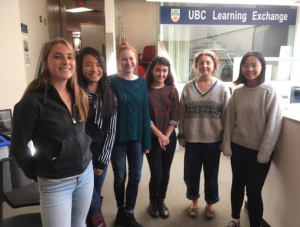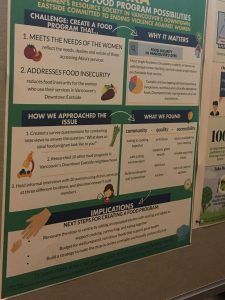For the past three months, our group has been collecting data at various locations on the Downtown Eastside trying to find out what women are looking for in a food program. We have gone through many ups and downs, but we are so thankful for the opportunity to do this project. While reflecting on course, we have come up with a moment of significance that we all share.

What?
When we finished our last interview and realized the finality of the semester, we felt relief and anticipation to compile the data and share our findings with the class. It is hard to gauge if the information we have collected is plausible for the centre to implement. In LFS 350 we have learned about food security and how it exists in communities close to us – such as Vancouver’s Downtown Eastside. The women’s resource centre, our community partner in Vancouver’s Downtown Eastside, wants to provide a food program that recognizes the needs of the women who will be using it, and in that way nourish these women with available food – a small step closer to achieving food security for many of these women who do not have economic access to healthy foods. Because this food program could have such a great importance in the lives of the women who will be using the service, we really hope the time invested by the women’s resource society in us and the effort we put in will make a difference – and make the food program one step closer to being a place of community, nourishment, and accessibility.
The process which required us to balance our schedules, figure out what is expected to result from our project, and learn to put our visions to work can be frustrating, yet we were able to work together as a team and hopefully produce some positive change.
For many of us, leaving the shelter after our last day felt strange because it seemed like there was a sense that change was imminent, where it may not have been. It seemed like the big-scale questions we were asking were sparking thought on the ideal food programs for women who were being questioned, while very few of their suggestions would actually be implemented due to logistics. It felt as if our attempts to make women feel like we were fully engaged, listening, and responsive to their needs and thoughts were only misleading them, since only one solution can be implemented and so many ideas will inevitably have to be thrown out. This made us think deeply on the reality of working with impoverished communities, which we want to do in the future: will we always be left feeling disappointed? How can we work with these feelings to be more productive in these kinds of roles?

http://news.heart.org/wp-content/uploads/2016/11/1117-News-Aramark_WP.jpg
So What?
Not knowing if our work will actually make a difference is hard to accept. What could have we done to make it better? There are limitations to this class that prevent some things that would have been more value to us in helping the women’s centre – especially time. When we first started collaborating with the women’s centre our coordinator told us they would prefer if our we could come into multiple sessions at the same place in order to build relationships with the women. By building relationships we could build trust, and perhaps have a more in depth conversation of what the women would really like to see in a food program. But as all of us are full time students, this was not our full time job and although we were able to visit varying locations around ten times, More sessions would have benefited our data collection. There was so much uncertainty and everything was in the air, from our side as well as with our community partner. If another group were to continue with this project, few things could be considered for improvement: better scheduled interview time that corresponded to program’s schedules, better promotion of the project, and a shorter administration period. With time as a constraint, we did a pretty good job of collecting as much data as we could, but with that said again, we hope that what we collected is plausible for the women’s centre to implement.
The thought that the world is inherently unequal is something our group has discussed. This project gave us the opportunity to try and make a difference in the lives of women who were given less opportunity and different lives than our group members. We are hoping our work can positively impact their lives, if only to provide food that is nutritious and of their needs and desires.
Now What?
Now that we are finished interviews, we need to compile our data in a presentable way. Not only will compiling our data in a meaningful way in our infographic and report be appreciated by our community partner, it is an excellent way to educate the broader UBC population about the issues of food security very close to our home. We will be focusing on writing final reports and presentations that address the needs of our audiences. How can we portray all that we have learned in all of these separate platforms appropriately? How can we give our community partner the most useful information only while not wasting their time? How can we integrate our personal learning into our presentation and final report that will be handed in to our professors in LFS 350?
During our presentations in the Nest, we hope to see students engaging in our projects – and learning about the importance of all aspects of the food system – including food security. And once the course is over, we really hope their food program is able to develop into the one that the women envisioned.
